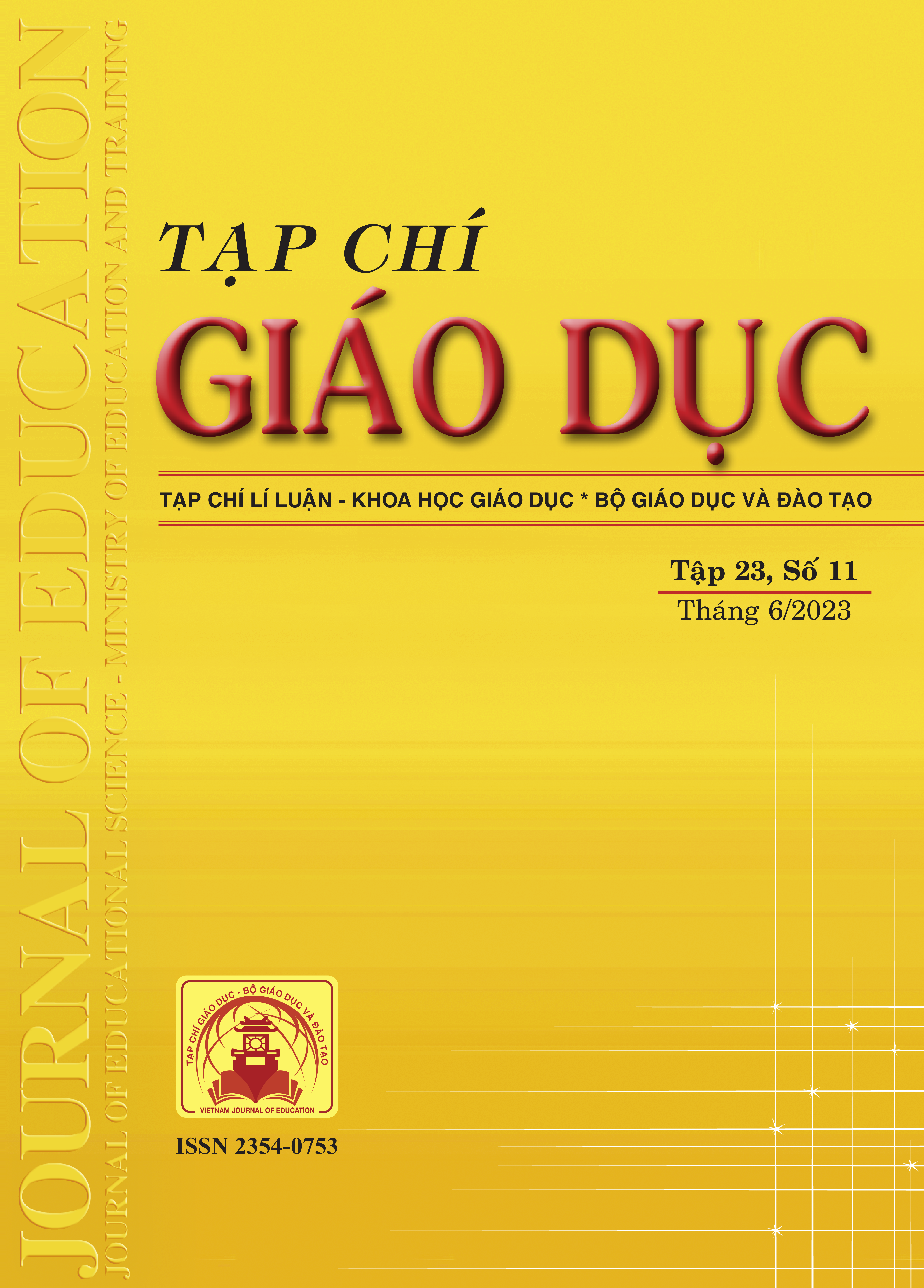Tiếp cận “khoa học công dân” trong nghiên cứu khoa học: nghiên cứu tại Trường Đại học Sư phạm - Đại học Đà Nẵng
Tóm tắt
Citizen science is gaining popularity with networks that promote global citizen participation to build large-scale and enduring data systems. However, in Vietnam, there have not been many studies on this issue. This study conducted research at the University of Education - the University of Danang to assess opportunities to promote scientific research activities through the citizen science approach. The results show that most students, staff and lecturers still did not have much knowledge about citizen science, but through training activities and testing coastal garbage monitoring, their interest level increased. The SWOT analysis also pointed out the strengths and opportunities to innovate scientific research to serve the community and expand connections with the locality in education and training activities at Vietnamese universities these days.
Tài liệu tham khảo
Alkalay, R., Pasternak, G., & Zask, A. (2007). Clean-coast index - A new approach for beach cleanliness assessment. Ocean & Coastal Management, 50(5-6), 352-362. https://doi.org/10.1016/j.ocecoaman.2006.10.002
Cooper, C.B., Dickinson, J., Phillips, T., Bonney, R. (2007). Citizen science as a tool for conservation in residential ecosystems. Ecology and Society, 12(2), 11. https://doi.org/10.5751/ES-02197-120211
Cosquer, A., Raymond, R., Prevot-Julliard, A.C. (2012). Observations of everyday biodiversity: a new perspective for conservation?. Ecology and Society, 17(4), 2. https://doi.org/10.5751/ES-04955-170402
Danielsen, F., Burgess, N. D., Jensen, P. M., & Pirhofer-Walzl, K. (2010). Environmental monitoring: The scale and speed of implementation varies according to the degree of peoples involvement. Journal of Applied Ecology, 57(6), 1166-1168. https://doi.org/10.1111/j.1365-2664.2010.01874.x
Fritz, S., See, L., Carlson, T., & Haklay, M. (2019). Citizen science and the United Nations Sustainable Development Goals. Nature Sustainability, 2(10), 922-930.
Hitchcock, C., Vance-Chalcraft, H., & Aristeidou, M. (2021). Citizen Science in Higher Education. Citizen Science: Theory and Practice, 6(1), 22. https://doi.org/10.5334/cstp.467
Hyder, K., Townhill, B., Anderson, L. G., Delany, J., & Pinnegar, J. K. (2015). Can citizen science contribute to the evidence-base that underpins marine policy?. Marine Policy, 59, 112-120. https://doi.org/10.1016/j.marpol.2015.04.022
Irwin, A. (2018). Citizen science comes of age. Nature, 562, 480-482. https://media.nature.com/original/magazine-assets/d41586-018-07106-5/d41586-018-07106-5.pdf
Jenkins, L. L. (2011). Using citizen science beyond teaching science content: A strategy for making science relevant to students’ lives. Cultural Studies of Science Education, 6(2), 501-508. https://doi.org/10.1007/s11422-010-9304-4
Kelly, R., Fleming, A., Pecl, G. T., Gonner, J. von, & Bonn, A. (2020). Citizen science and marine conservation: A global review. Philosophical Transactions of the Royal Society B, 375(1814), 1-13. https://doi.org/10.1098/rstb.2019.0461
Kosmala, M., Wiggins, A., Swanson, A. & Simmons, B. (2016). Assessing data quality in citizen science. Frontiers in Ecology and the Environment, 14, 551-560.
Liu, H. Y., Dörler, D., Heigl, F., & Grossberndt, S. (2021). Citizen science platforms. The Science of Citizen Science, 439-459.
Malone, T. W., Laubacher, R., & Dellarocas, C. (2010). Harnessing crowds: Mapping the genome of collective intelligence. Sloan Management Review, 51(3), 21-31.
Mitchell, N., Triska, M., Liberatore, A., Ashcroft, L., Weatherill, R., & Longnecker, N. (2017). Benefits and challenges of incorporating citizen science into university education. PLOS ONE, 12(11), e0186285. https://doi.org/10.1371/journal.pone.0186285
Roche, J., Bell, L., Galvão, C., Golumbic, Y. N., Kloetzer, L., Knoben, N., Laakso, M., Lorke, J., Mannion, G., Massetti, L., Mauchline, A., Pata, K., Ruck, A., Taraba, P., & Winter, S. (2020). Citizen Science, Education, and Learning: Challenges and Opportunities. Frontiers in Sociology, 5, 613814. https://doi.org/10.3389/fsoc.2020.613814
Taylor, M. P., Isley, C. F., Fry, K. L., Liu, X., Gillings, M. M., Rouillon, M., Soltani, N. S., Gore, D. B., & Filippelli, G. M. (2021). A citizen science approach to identifying trace metal contamination risks in urban gardens. Environment International, 155, 106582. https://doi.org/10.1016/j.envint.2021.106582
Theobald, E. J., Ettinger, A. K., Burgess, H. K., DeBey, L. B., Schmidt, N. R., Froehlich, H. E., Wagner, C., HilleRisLambers, J., Tewksbury, J., Harsch, M. A., Parrish, J. K. (2015). Global change and local solutions: tapping the unrealized potential of citizen science for biodiversity research. Biological Conservation, 181, 236-244. https://doi.org/10.1016/j.biocon.2014.10.021
Vohland, K., Land-Zandstra, A., Ceccaroni, L., Lemmens, R., Perelló, J., Ponti, M., Samson, R. Wagenknecht, K. (2021). The science of citizen science (p. 529). Springer Nature.
Warner, K. A., Lowell, B., Timme, W., Shaftel, E., & Hanner, R. H. (2019). Seafood sleuthing: How citizen science contributed to the largest market study of seafood mislabeling in the U.S. and informed policy. Marine Policy, 99, 304-311. https://doi.org/10.1016/j.marpol.2018.10.035
Tải xuống
Đã Xuất bản
Cách trích dẫn
Số
Chuyên mục
Giấy phép

Tác phẩm này được cấp phép theo Ghi nhận tác giả của Creative Commons Giấy phép quốc tế 4.0 .












